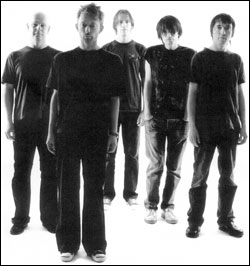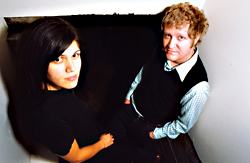I am sitting in front of my computer late at night. Alone. With headphones on. It’s the best place I can imagine to fully absorb the various sonic wrinkles woven deeply into the fabric of any given Radiohead release. Occasionally it occurs to me that this is how the band intended its music to be received: a nation of millions absorbing the 1’s and 0’s of its codebase in isolation, listener by listener, like some sort of slow-motion domino topple.
I idly catch myself wondering how much better it might be if I were properly zonked on whatever it is that’s required to open oneself up to all the little pointillist pain pricks that occasionally, and violently, poke through the surface of the music. Bear in mind that I’m only two tracksless than five minutes totalinto the band’s latest opus, and already singer Thom Yorke is hard at work trying to disturb my inner peace. And doing a damn fine job of it, too.
The song in question, “Sit Down, Stand Up,” is built on a roiling piano foundation with bells tinkling like broken glass around the melody line, when Yorke’s quavering voice begins its series of disembodied militaristic commands: “Sit down. Stand up. Walk into the jaws of hell. We can wipe you out anytime. Sit down. Stand up.” The tension builds around a slowly rising drum roll while Yorke wails behind the steadily expanding shower of noise, finally crashing into a double-time bridge that repeats the phrase “the raindrops” a total of 47 times (the vocal equivalent of sit-ups performed under duress) before the whole thing comes to an abrupt halt.
Somehow, I can’t help but feel we’ve been here before.
THERE IS BOTH GOOD and bad in being one of the longest-running acts of your generation. The upside is that with each successive album, there is a built-in fanbase for your work, one that will enthusiastically lap up all but the most turgid droppings from the creative table. The downside is that the mathematical probability of repeating yourself in some crucially destructive fashion becomes greater with each passing year.
And this is my primary grievance with Hail to the Thief (out June 10), Radiohead’s seventh full-length release over the course of its 15 years . It’s not a terrible album; far from it. I suspect that fans of the band’s early work will find much to love about the way in which producer Nigel Godrich has taken pains to place guitars and drums so centrally in the album’s mix. In fact, it’s nearlybut not quitethe “return to rock” and/or form promised by various and sundry over the course of the five years since Radiohead released their last album of true artistic merit, 1997’s OK Computer, the Gen-X set’s very own Dark Side of the Moon and the high-water mark by which the rest of the group’s work will be forever judged.
But even when handicapped against this almost insurmountable standard, some very real flaws remain evident on Thief; chief among these are the disturbing signs of a band that sounds like it’s marking time until its next great idea. Having already made mincemeat of fan expectations on the electronic- influenced experiments Kid A and Amnesiac (albums released a year apart but drawn from the same chilly, weirded-out recording sessions that nearly tore the band asunder), by now there seems little else Radiohead can do to truly surprise anyone, aside from perhaps writing a polka-inspired rock opera about the hidden political merits of George W. Bush. “Tweedle Dubya,” anyone?
You get the picture: This is a band caught dawdling in the fierce tailwinds of a continental drift, a group that appears to have given up the quest for “challenge” in exchange for letting its past work float it along on the breeze of momentum. How else to explain a song as lovely as “Sail to the Moon,” a piano ballad that would easily qualify as one of the most stunning things the group has ever recorded, if it hadn’t already done the same damn thing two years ago with Amnesiac‘s “Pyramid Song.” Even the lyrical conceits of the two are the same: On “Pyramid Song,” Yorke imagined an underwater world where former lovers, black-eyed angels, and a heaven-bound rowboat would whisk him away from an earthly existence loaded with uncertainty and fear, whereas on “Moon” he simply makes his wish for redemption less allegorical: “Maybe you’ll be president/But know right from wrong/Or in the flood you’ll build an ark/And sail us to the moon.” Even if you tried to build a case that he’s stringing along a narrative intended to thread multiple works together and, frankly, you can’tit just sounds lyrically lazy (if nevertheless beautiful to behold at first listen).
Hail to the Thief abounds with such transgressions. The album’s final track, “A Wolf at the Door,” is perhaps the worst of the lot, starting as it does with an interpolation of the carefully picked ascending/descending guitar chords the Beatles made so indelible on “I Want You (She’s So Heavy)” and pairing it with Yorke’s best free-associative Dylan impersonation à la “Subterranean Homesick Blues.” Yorke rap-sings his way through a litany of paranoid-android complaints against society’s class barriers and the slow creep of modernizationall while ripping off Monty Python (“dragging out your dead”) in the bargain. It’s a track that’s stunning in its way, as brazen a borrowing spree as I’ve heard from this quintet in all its time together, up to and including the obvious Pixies/Nirvana rip-off “Creep” so many years ago.
OF COURSE, THERE are also redemptive measures to be found on Thief, buried like devalued treasure among the archaic ruins of what initially appears to be classic architecture but ultimately reveals itself to be, er, ruins. “Go to Sleep” makes economical use of standard-issue creeping dread Yorke speak (“something for the rag and bone man, over my dead body”) but sets it to the most plentiful array of guitars on a Radiohead track since 1997’s “Airbag.” “Where I End and You Begin” employs a shuffling drum undercurrent, wicky-wicky click/clack guitar scree reminiscent of Wire or the Gang of Four, and a rather impressionistic recitation of love’s ebb and flow, as Yorke closes that song with an icily dispossessed chant: “There’ll be no more lies, I will eat you alive.” And then there’s the album’s first single, “There There,” a typically disturbed recounting of Yorke’s simultaneous urges to both seek the truth in a relationship (“There’s always a siren singing you to shipwreck”) and run as fast as he can in the other direction (“stay away from these rocks, we’d be a walking disaster”).
But just when you think the boys have somehow overcome the urge to duplicate their back catalog, along comes “We Suck Young Blood,” a song first referenced by bassist Colin Greenwood in an August 2001 interview with Rolling Stone in which he described the piece as being about “these multiplatinum artists hooking up with the latest French disco producer to do their new record.” (Madonna: You’ve been outed, please call your office.) Yorke, for his part, has merely said that it’s “about Hollywood”; in any event, it’s a nearly unlistenable dirge that completely nixes any momentum the band had built up to this point in the record.
By the time the snoozy, electro-beat beds of “The Gloaming” roll like purposeless tumbleweeds across the barren sonic landscape, it’s become clear that this is a record about ennui: Like Pink Floyd’s “Wish You Were Here,” it’s an inside-baseball examination of the very problem that seems to beset the record creatively. Yorke’s recitation of the song’s lyrics is almost like a mantra sung privately to himself: “Funny how/when the walls bend, when the walls bend/with your breathing, with your breathing/they will suck you down to the other side.” It’s claustrophobic, strange in a contrived sort of way, and stuck in the same emotional rut Yorke has been digging for several albums straight.
THE SYMBOLIC CHAMPION of the Repeater Principle is without question the funereal ballad “I Will,” which not only adopts a tonal approach similar to that found on Amnesiac‘s “You and Whose Army?” or Kid A‘s “How to Disappear Completely,” but also contains the same musical accompaniment found on the former’s “Like Spinning Plates” (which, as it so happens, took this particular backing track and merely played it backward). Radiohead has been accused of this sort of lazy self-pilfering before”Morning Bell” shows up on both Kid A and Amnesiac in two radically different versionsbut never was it this baldly apparent. The Mighty Oz was always protected by the facade, throwing his levers this way and that to divert attention from what was ultimately just a little man with a God complex playing Merlin the Magnificent for his audience. With the curtain drawn back, we can now see the ruse for what it is: good people with the best intentions making the same music they’ve made before, but calling it something new.
One might rightly ask if it’s fair to impose the kind of outsize expectations on Radiohead that we have. A record this good by any other bandparticularly one just starting outwould be greeted by critics and fans alike as the potential salvation of thinking man’s rock, the rightful heir to the kingdom first populated by the likes of the Beatles, Pink Floyd, Talking Heads, U2, and other acts of exalted magnitude. And history may yet show that Hail to the Thief is a worthy addition to the Radiohead canon, the logical extension of the band’s legacy and a welcome coda to what came before.
Me? I find it a somewhat depressing, decreasingly clever bit of “dine and dash” at the Radiohead Cafe. It’s not clear if stealing from yourself has yet been declared a crime, but if so, Radiohead would be looking straight down the barrel of a 10-year sentence for grand theft audio.








